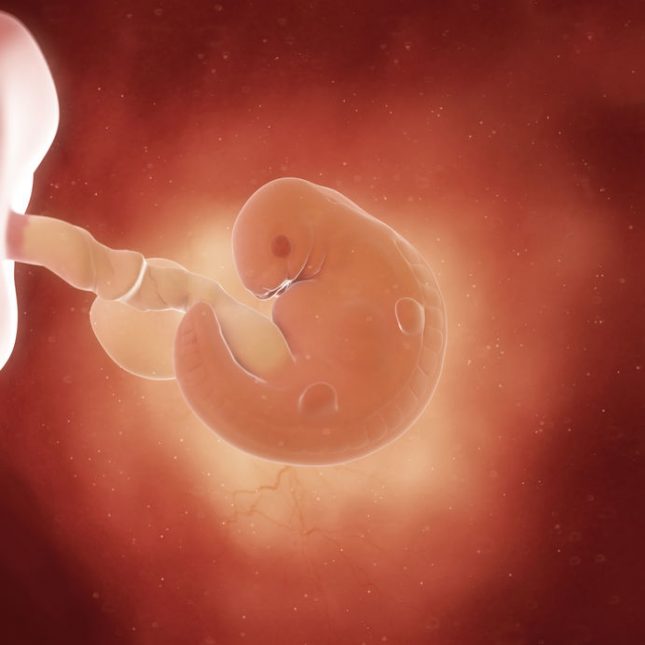In association with professional midwife experts at birthEd, find out everything you need to know about pregnancy at 6 weeks, including how your baby is growing, changes to expect in your body and pregnancy health, nutrition and wellness advice.
| Week 5 |
Week 7 |
6 Weeks Pregnant – Your baby, your body & you
Your Baby
Your baby is now 0.51-0.63cms in length – about the size of a small pea. At this stage a very basic heartbeat can be seen on an ultrasound, usually beating around 150-160 beats per minute, which is twice the rate of yours!
Your baby has been growing rapidly over the last week. It now has a large head and smaller C shaped body. Their facial features are slowly becoming more pronounced and their kidneys, liver, lungs and pituitary gland are growing bigger and more developed.
Small buds are growing to form your baby’s limbs, in a few weeks you’ll be feeling those strong little limbs practising karate with your ribs!
Your Body
Why are you getting morning sickness? How can you avoid it? And why isn’t it in the morning? Great questions.
Despite the name, morning sickness can cause discomfort at any time of the day. 69% of pregnant women experience it and 67% of these women will vomit.
This early pregnancy symptom may be caused by increased hormone levels and reduced blood sugar levels – other contributing factors may be increased stress or excessive fatigue. Every pregnancy is different unfortunately and there is not one magic trick that helps all morning sickness.
- Some women have found eating smaller meals high in protein and unprocessed carbohydrates more frequently helps to maintain their blood sugar levels – eat every 2-3 hours
- Eat 5-6 small meals a day rather than the traditional 3
- Drink plenty of water
- Increase the amount of rest you are having
- Minimise work and home stress
- Eat a carbohydrate food first thing in the morning (perhaps just a smoothie) and wait 20 minutes before getting out of bed
- Eat protein before going to bed at night, or if you are up during the night
- Avoid refined, spicy and fatty foods
- Reduce caffeinated drinks – coffee and tea
- Try ginger or peppermint tea and salty crackers or nuts to snack on during the day
- One therapy you may consider is acupuncture. Acupuncture can be an effective treatment for women who experience nausea and dry retching in early pregnancy. Even holding specific acupressure points can relieve nausea.
- Pyridoxine (vitamin B6) Studies have shown that pyridoxine improves mild to moderate nausea but does not significantly reduce vomiting. The recommended dose in pregnant women is 25–50 mg, up to three times per day
If you do have morning sickness that is accompanied with vomiting remember to increase your water intake to avoid dehydration.
You
You may have only found out about your pregnancy recently and on top of that you may also be experiencing some of those early pregnancy symptoms which can be quite uncomfortable. Changes in your mood are very common in these early weeks. This may be triggered by the large fluctuations of estrogen and progesterone levels, anxieties around the major changes happening in your life and metabolic changes.
We recommend spending some time this week journaling. Journaling throughout your pregnancy can be a great therapy for you, it can also be a special keepsake to look back on when your baby is all grown up and you’re remembering back to a time when you hadn’t yet met them.
Preparing for Baby
When you’re ready, you may like to find yourself a Lead Maternity Carer (LMC). Your LMC will provide you with all or most of your antenatal care and will continue to look after you and your baby for 4-6 weeks after the birth.
This is a very intimate and special time in your life, and you will want a supportive relationship with an LMC you can trust. You may rely on a recommendation from a friend to find an LMC, or you may need to interview several to find someone who matches your personality and birthing philosophy.
Whoever you choose, remember that proper antenatal care is recommended for a successful and healthy pregnancy. Your midwife or doctor will be looking after the physical health of you and your developing baby, but will also be there to support your emotional and mental health through pregnancy and the first several weeks postpartum.
If, for any reason, you are unsatisfied with your LMC you can find someone new! However, it is recommended that if you decide to change your LMC it is best to do so early in the pregnancy to maintain continuity of care. If your LMC feels you need a higher level of care, she may refer you to a specialist.
In New Zealand, the costs for antenatal care are covered by the Ministry of Health (MOH) for primary maternity care. Specialist Obstetricians are not covered, unless you are referred to one due to complications in your pregnancy.
If you don’t already have one in mind, you can find a midwife in your area using this website.
New Zealand is currently experiencing a shortage of midwives in some areas and so depending on where you live, you may need to see a midwife who is part of a community team at your local hospital.
Your Relationships
This is a great week to reach out to someone who you trust. Organise to meet for a herbal tea or a walk. Ask them if you can talk about what’s going on for you – this is important because everyone has their own stuff going on and sometimes they may not have the capacity to support you.
When you are ready, share it all, open up to what’s going on for you, how you are feeling, what you are thinking. Sometimes just talking things out and talking things through can be a really powerful therapy.
If you don’t have someone close that you feel safe opening up to then find a counsellor or psychologist that you can build a relationship with throughout your pregnancy, support during this time is crucial.
This Week’s Preparation
Start your LMC research. Ask your friends for recommendations. Read profiles on findyourmidwife.co.nz . Ask yourself the question “What qualities am I wanting in a lead maternity carer?”
Eat small nutritious meals more frequently to avoid morning sickness.
Take your prenatal vitamins, iodine and additional folic acid supplements
Cut back on your caffeine intake
Increase your consumption of fruit and vegetables and cut back refined sugar and trans-fats.
Back to 52 Weeks of pregnancy.
Research
Smith C, Crowther C, Beilby J. Acupuncture to treat nausea and vomiting in early pregnancy: a randomized controlled trial. Birth. 2002;29(1):1-9. doi:10.1046/j.1523-536x.2002.00149.x








